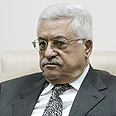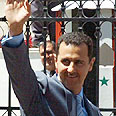

"The meeting in November should define the principles settling the questions over the final status (of the Palestinian territories)," Abbas said in an interview in New York, where he is attending the UN General Assembly.
The leader of the Palestinian Authority, who has met with several foreign leaders during his stay in New York, said that the US-sponsored talks would open in Washington on November 15.
The leader of the Palestinian Authority, who has met with several key foreign leaders during his stay in New York, said that the US-sponsored talks would open in Washington on November 15.
"We have noted that the whole world is interested in this meeting and attaches great hopes to its success," he added.
Abbas said that Palestinian and Israeli negotiators would start to tackle preparations for the gathering in the coming days.
"We want to prepare a framework agreement defining clear principles and without equivocation that will serve as a basis for the settlement. Immediately after the meeting we will hold negotiations on the basis of this document."
Key stumbling blocks in previous talks between Israel and the Palestinians have included the borders of a future Palestinian state, the fate of the Jewish settlements, the status of Jerusalem and the question of Palestinian refugees.
"We, the Israelis and the Arabs, must make this meeting succeed," he said.
He said the members of the Middle East quartet, the permanent members of the UN Security Council, the follow up committee of the Arab League and certain countries from G8 and the non-aligned movement should take part in the talks.
The international quartet, which groups the United States, United Nations, European Union and Russia, issued a "roadmap" for Israeli-Palestinian peace in 2003 originally envisioning the creation of a Palestinian state by 2005.
"We hope that Syria and Lebanon will also participate in the meeting," he added. The United States announced this week that it would invite Syria to the talks, but Damascus has expressed reservations about taking part.
Asked whether an agreement could be applied in the Gaza Strip, where Hamas took power by force in June, Abbas called on the Islamist movement to "place the interests of the Palestinian people above all other considerations."
"If the situation in the Gaza Strip returns to how it was (before Hamas seized power) we will be ready to talk," he said.
But a recent flare-up in violence in the Gaza Strip, declared by Israel as a "hostile entity" and where 13 Palestinians were killed this week by Israeli attacks in response to militant rocket fire, has complicated the task.
However, Abbas remained optimistic, saying: "Any attempt at sabotage is doomed to fail."
US President George W. Bush, who is organizing November's summit, met with Abbas on Monday, but made no reference to the gathering after the talks.
US courts Arabs by inviting Syria to peace talks
The United States' somewhat grudging offer to invite diplomatic adversary Syria to its Middle East peace conference is largely to provide political cover for other Arab states to take part, US officials said.
The Bush administration's most high-profile attempt to promote Israeli-Palestinian peace is expected to take place in November and the United States on Sunday signaled its willingness to invite Syria.
However, US officials suggested they did so with little enthusiasm because of their disagreements with Damascus over Iraq, Lebanon and its support for Hamas, the terrorist group and political party that rules the Gaza Strip.
The United States has long criticized Syrian influence in Lebanon, which US officials believe has continued despite the 2005 withdrawal of Syrian troops from its southern neighbor.
The United States also accuses Syria of fomenting violence in neighboring Iraq by allowing arms and fighters to cross its border and criticizes Damascus for supporting Hamas, the Palestinian militant group and political party that seized control of the Gaza Strip and has rejected the conference.
A senior US official, who spoke on condition that he not be named, said Washington had signaled its willingness to invite Syria chiefly out of a desire to get other Arab states to come. To exclude Syria would provide "an easy excuse" for other Arab states to stay away, he said.
"Others have to have them there or they would feel at risk that they didn't have the appropriate cover for their own participation," he added, saying the United States would not exclude Syria but "we don't cherish their participation."
"You balance the discomfort of their presence, because of these problems that we have with them, against the value of the presence of others," he said.
The United States disclosed its plan to include Syria indirectly, saying it would invite the members of an Arab League panel following up the group's 2002 peace initiative.
Not an easy decision
In addition to the Palestinian Authority, the group includes Syria, Lebanon, Qatar, Saudi Arabia, Jordan and Egypt. Only the last two have full relations with Israel, while Syria and Lebanon are deeply estranged from the Jewish state.
The Arab League peace peace initiative calls on Israel to withdraw from all Arab land occupied in the 1967 Middle East war; to reach an "agreed, just" solution for Palestinian refugees; and to accept a Palestinian state in the West Bank and Gaza Strip with east Jerusalem as its capital.
In return, Arab states would consider the conflict over and enter a peace treaty with Israel; achieve comprehensive peace for all the states of the region; and establish normal relations with Israel.
US Secretary of State Condoleezza Rice said the Arab initiative would be a cornerstone of the conference, which the United States hopes will provide broader Arab backing for an eventual Israeli-Palestinian peace deal.
"So we faced a choice: Did you try and exclude a member of this committee, causing untold difficulty for others in trying to figure out whether or not they could then come ... or did you just say the entire committee is invited?" Rice told Fox News in an interview on Monday. "We decided on the latter, not one of the easier decisions we've ever had to make."
Rice on Sunday stressed that countries that attend should renounce violence and support Israeli-Palestinian peace.
The official who asked not to be named said he did not expect Syria to change policy on Lebanon, Iraq or Hamas.
"If they did something different that would be great but I think we are assuming that they will continue to misbehave," he said.
He also said the United States reserved the right not to formally invite Syria but did not expect that to happen.
Israeli and Palestinian officials said asking Syria to the conference could test its willingness to break with Palestinian militants including Hamas, which seized the Gaza Strip in June and has rejected the U.S.-sponsored conference.
"That could occur. I'm not sanguine it will," the official said.
Reuters contributed to this report















